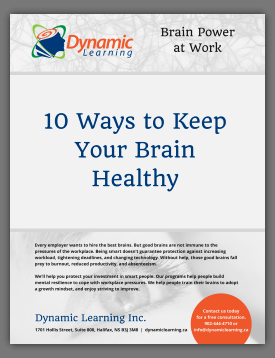I am excited to attend the NeuroLeadership Summit in New York. Neuroscientists who are interested in the applying brain research to the workplace plus leaders in the Fortune 1000 companies – over 600 people – will be there.
One thing I will be learning about is their work with more than 55 companies who have been implementing a Growth Mindset approach to management development since 2013.
Recently I took part in a webinar put on by the NL Institute featuring Adobe Systems who have spent the last 4 years completely reorganizing their performance management system to incorporate a growth mindset into their culture. I was amazed to see 1001 people were attending the webinar, which means there is tremendous interest now in the Growth Mindset. I believe it works so well because it mirrors much more closely how our brains learn.
In the meantime, here is a tried and true method for having relaxed conversations about performance with your employees and/or your manager on a regular basis, while fitting in with whatever PM system your organization already has.
The Rap Process
This approach was originally developed by Marriott Hotels and has been used very successfully by them and other organizations for over 50 years.
Background
Rap sessions are a key tool which support the setting and achievement of quarterly goals. Managers facilitate a RAP session preferably at least once a month with each employee. The meeting should be one-on-one with the employee in a private area. It should last not less than 10 minutes and not more than 30 minutes. The manager make notes on issues discussed to use as a reminder on what has been agreed.
Even when relationships are solid, both employees and managers can lack the tools for dealing with performance issues, in either direction. The format is designed to be non-confrontational and relaxed.
Specifically RAPS can:
- help managers and employees collaborate to achieve goals
- give the employee the manager’s undivided attention for a few minutes each month
- enhance communications and performance
- reduce misunderstandings and employee turnover
- enhance customer response and focus
- foster a growth mindset
A manager might start with 1 or 2 good employees to get comfortable with the procedure and gradually expand to include all direct reports. Employees usually love this process, so start with your best people who deserve most of your attention. This will also make the RAP process more desirable for all your employees.
Procedure
Format: minimum 10, maximum 30 minutes – preferably once a month, but at least quarterly. Often Item 1 takes about 40% of the time, Item 2 takes another 40%, and Item 3 takes the remaining 20%.
1. Manager asks employee (and notes)
- What’s working, at the moment, in your job or your relationships here?
- What’s not working?
- What do you need from me? Or how can I help you with these issues?
Manager’s role: Listen to understand fully from employee’s point of view, paraphrase, ask good open-ended questions, and summarize what they have understood until the employee agrees they have ‘got it’. Manager makes sufficient notes to act as good reminders later.
Employee’s role: Explain fully until confident their manager has got it. May make notes.
2. Manager outlines
- What’s working for me re your performance and our relationship (reinforces growth performance).
- What’s not working for me (this is where I think you can grow and get better).
Employee’s role: Listen to understand fully from manager’s point of view, paraphrase, ask good open-ended questions, and summarize what they have understood until the manager agrees they have ‘got it’.
3. What actions can we both take to improve our circumstances?
- Both agree on action items required of either, and time frames.
- Manager takes notes and records the things that each commits to.
- Employee takes responsibility for his or her own growth and development.
- Manager keeps notes on employee’s file. These notes are reviewed for progress at next rap session.
Want to know more about a Growth Mindset approach? Read Fixed vs. Growth Mindset for examples.


